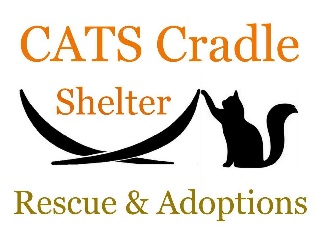Thank you to our guest writer, Nomi Berger! Originally posted 11/20/2020
Thanksgiving is a festive time, filled with feasting, family, and friends. But it’s also a time of potential distress for our feline companions. Any changes in a cat’s regular routine – a calm home now crammed with new scents, sounds and strangers — can send even the least “fraidy cat” cat scampering for cover.
To reduce your furry friend’s stress level (and YOURS), maintain her regular feeding and playing routine with some extra interactive play sessions for good measure. Keep all but the most social cats in a separate room, then ensure that your social “cat-erfly” doesn’t dart out into the night when the door opens and your guests arrive. Should the worst happen and she does disappear, make certain that she has either been micro-chipped or is wearing a collar with up-to-date tags for proper identification and a swift return to your waiting arms.
As tantalizing as Thanksgiving food is for people, some can prove painful, even fatal for cats. The most notorious offenders are:
Chocolate: All chocolate, especially semi-sweet, dark and baking chocolate contain the toxic, caffeine-like ingredient theobromine. Candy containing the artificial sweetener xylitol, is also dangerous. If you suspect that your cat has eaten something toxic, promptly call your veterinarian or the ASPCA Animal Poison Control Center at 1-888-426-4435 or the Pet Poison Hotline at 1-800-213-6680 (fees apply in both instances).
Turkey stuffing: It often contains onions and garlic, raisins and spices – all of them toxic to cats. The sulfoxides and disulfides in onions and garlic destroy the red blood cells and can cause serious blood problems, including anemia. The effects of ingesting raisins and/or spices usually occur within 24 hours and include lack of appetite, lethargy, weakness, abdominal pain, diarrhea, and decreased urination.
Cooked turkey bones and gristle: Turkey bones splinter easily and can get caught in your cat’s throat or esophagus. They can also cause intestinal blockages or perforations leading to infection, while turkey gristle presents a clear and present choking hazard. To safeguard against these painful possibilities, all leftovers should be carefully wrapped and promptly disposed of.
Alcohol: To avoid intoxication and alcohol poisoning, keep all full glasses and half-filled glasses of wine or spirits out of reach of your cat’s curious nose and playful paws.
And yet, there’s no harm in providing your kitty with her own Thanksgiving feast, one that includes a few small, boneless pieces of cooked turkey, a taste of mashed potato or even a lick of pumpkin pie.

